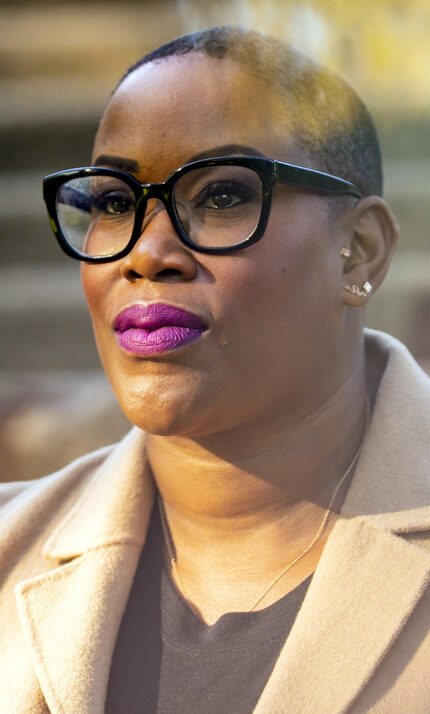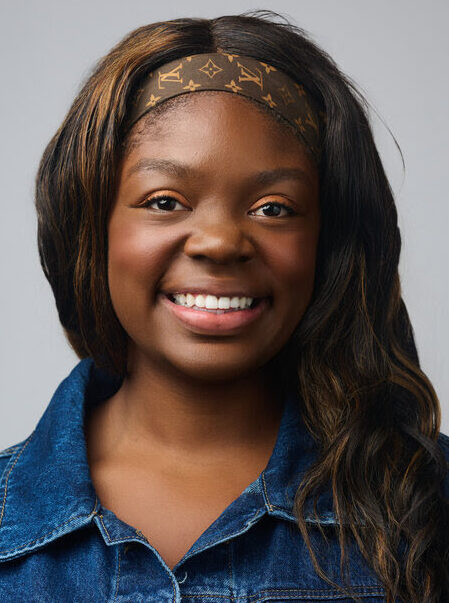(Notices 3-6-25)
Homepage image credit: ABC News
Support Journal-ismsDonations are tax-deductible.
In February, the Pew Research Center hosted a virtual panel event about influencers as a source of information about current events and civic issues in the U.S., which included Makena Kelly, senior politics writer, Wired; Mosheh Oinounou, founder, Mo News; Raven Schwam-Curtis, content creator and keynote speaker) and Galen Stocking, senior computational social scientist, Pew Research Center). (Credit: YouTube)
What About These Social Media Influencers?
All journalists know this: “The journalism and media industry in 2025 is undergoing a dramatic transformation, driven by rapid technological advancements, shifting audience behaviors, and the economic realities of a digital-first world,” as career consultant Jennie Johnson said in a message Wednesday.
“Traditional newsrooms, long the backbone of the profession, are shrinking under the weight of declining ad revenues and competition from digital platforms. In just the first quarter of 2025, over 900 journalism jobs were cut across the U.K. and U.S., adding to the staggering 15,000 layoffs reported in 2024. These sobering statistics reflect a broader trend — one in which legacy media outlets struggle to adapt to an industry increasingly shaped by artificial intelligence, independent content creators, and niche digital platforms.”
And some might know this:
“Black, Hispanic and Asian American adults are more likely than white adults to put a great or moderate amount of confidence in election information they receive from social media (38%, 32% and 30% vs. 19%),” the American Press Institute reported last year.
How can journalists survive and thrive in this new environment of social media and social media influencers?
That will be the subject of our next Journal-isms Roundtable, to be held by Zoom at 7 p.m. Eastern on Monday, March 24.
Our panelists are:
 Meredith D. Clark, Ph.D, researcher, journalist, teacher, media consultant and author of “We Tried to Tell Y’all: Black Twitter and the Rise of Digital Counternarratives.”
Meredith D. Clark, Ph.D, researcher, journalist, teacher, media consultant and author of “We Tried to Tell Y’all: Black Twitter and the Rise of Digital Counternarratives.”
 Adriana Lacy, who has spent more than a decade working in audience engagement, including working at The New York Times and Axios, and now heads her own consulting agency to help newsrooms adopt the best practices of creator journalism.
Adriana Lacy, who has spent more than a decade working in audience engagement, including working at The New York Times and Axios, and now heads her own consulting agency to help newsrooms adopt the best practices of creator journalism.
 Philip Lewis, deputy editor at HuffPost, news aggregator and president of the Washington Association of Black Journalists, who was called “The Anderson Cooper of Black Twitter” last year by Wired magazine.
Philip Lewis, deputy editor at HuffPost, news aggregator and president of the Washington Association of Black Journalists, who was called “The Anderson Cooper of Black Twitter” last year by Wired magazine.
 Samantha Ragland, vice president, journalism programs, American Press Institute; journalist, educator and digital strategist. She is quoted at length this week in Editor & Publisher, saying,”Traditional outlets can learn from influencers’ audience engagement strategies, while creators can benefit from established journalistic practices.“
Samantha Ragland, vice president, journalism programs, American Press Institute; journalist, educator and digital strategist. She is quoted at length this week in Editor & Publisher, saying,”Traditional outlets can learn from influencers’ audience engagement strategies, while creators can benefit from established journalistic practices.“
Fortunately for all concerned, Klaudia Jaźwińska wrote Thursday for Columbia Journalism Review, “recent months have shown growing recognition among some traditional journalists of the value in viewing their relationship with so-called influencers as complementary or collaborative, rather than competitive.”
Who’s in?
Those not on the Journal-isms email lists may reply to < jroundtable5 (at) gmail.com >
Zoom information will come after RSVP’s.
We are expecting to simulcast this Roundtable on Facebook and to post it afterword on YouTube.
Background on Journal-isms Roundtables here
Further reading:
- Camille Bromley, Columbia Journalism Review: Q&A: Bloomberg’s Davey Alba and Leon Yin on the New Political Influence of Podcasts (Feb. 19)
- Feedspot: Top 100 Black Influencers in 2025 (Feb. 22)
- Feedspot: Top 80 Asian American Influencers in 2025 (Feb. 22)
- Feedspot: Top 100 Indigenous Influencers in 2025 (Feb. 22)
- Aisha Frazier and Jessica Mendoza, ABC News: Hispanic Influencers reflect on their impact, untapped potential (Sept. 16, 2023)
- Katherine Fung, Newsweek: Why Is Everyone Suddenly on Substack?
- Kayla Gogarty, Media Matters for America: The right dominates the online media ecosystem, seeping into sports, comedy, and other supposedly nonpolitical spaces (March 14)
- Drew Harwell and Sarah Ellison, Washington Post: Inside the White House’s new media strategy to promote Trump as ‘KING’
- Samantha Hooley, National Press Foundation: Social First: How Journalists Can Win Gen Z Audiences (Feb. 21, updated March 6)
- Journal-isms: A Plea: Save Us From Social Media Propaganda (Dec. 16, 2024)
- Journal-isms: Increasingly, More Put Their Trust in Gossip (Oct. 21, 2024)
- Journal-isms: People of Color Too Trusting of Social Media? (May 5, 2024)
- Betsy Klein, CNN: Influencers get prime DNC access as part of Harris’ campaign strategy (Aug. 22, 2024)
- Charlotte Klein, New York: The New Substack Universe (March 20)
- Jake Lahut, Columbia Journalism Review: The New Kids in the Room (Feb. 19)
- Cynthia Littleton, Variety: Roland S. Martin Enlists Social Media Political Sensation Knowa De Baraso for Black Star Network (Aug. 31, 2024)
- Cynthia Littleton, Variety: ‘This Is Hope 2.0′: Roland S. Martin on the DNC’s Embrace of Alternative News Outlets, Kamala Harris’ Moment and Fighting Misinformation (Aug. 20, 2024)
- National Press Foundation, YouTube: News Influencer Kelsey Russell on What Journalists Can Learn from Content Creators (video) (Feb. 25)
- Jason Parham, Wired: The Anderson Cooper of Black Twitter Believes Journalism Can Survive Influencers (June 14, 2024)
- Pew Research Center: Social Media
- Sarah Scire, Nieman Lab: The Washington Post’s TikTok guy will publish a Post-produced news series on his personal channel (Feb. 27)
- SocialBook: Top 20 African American Instagram Influencers to Follow in 2025 (Oct. 8, 2024)
- Todd Spangler, Variety: YouTube at 20: How the Video Colossus Launched the Creator Economy and Turned From Hollywood Foe to Friend
- Diane Sylvester, Editor & Publisher Magazine: The new ‘army’ of journalists: Creators and influencers impact our industry
- Hanaa’ Tameez, Nieman Lab: Noosphere aims to create a subscription bundle for your favorite journalists’ content
- Max Tani, Semafor: House Democrats organize digital creators to counter Trump’s speech
- Max Tani, Semafor: Reporters launch new TikTok-like news platform (Feb. 23)
- Max Tani, Semafor: Democrats, influencers huddle for a new new media strategy (Feb. 16)
- Jessica Testa, New York Times: A Political Reporter Takes Her Scoops to YouTube (March 9)
- Lamar West, BuzzFeed: 19 Latine Creators That Are Killing The Game Right Now And Deserve Your Follow (Oct. 9, 2024)
- Ariel Zirulnick, American Press Institute: Develop your influencer strategy A step-by-step process to demystify influencer collaborations and enhance community outreach
- Rob Tornoe, Editor & Publisher: SNARF: Killing social media? News organizations must decide if and how to use social media in their pursuit of audience (March 14)
To subscribe at no cost, please send an email to journal-isms+subscribe@groups.io and say who you are.
Facebook users: “Like” “Richard Prince’s Journal-isms” on Facebook.
Follow Richard Prince on Twitter @princeeditor
Richard Prince’s Journal-isms originates from Washington. It began in print before most of us knew what the internet was, and it would like to be referred to as a “column.” Any views expressed in the column are those of the person or organization quoted and not those of any other entity. Send tips, comments and concerns to Richard Prince at journal-isms+owner@
View previous columns (after Feb. 13, 2016).
View previous columns (before Feb. 13, 2016)
- Book Notes: Is Taking a Knee Really All That? (Dec. 20, 2018)
- Book Notes: Challenging ’45’ and Proudly Telling the Story (Dec. 18, 2018)
- Book Notes: Get Down With the Legends! (Dec. 11, 2018)
- Journalist Richard Prince w/Joe Madison (Sirius XM, April 18, 2018) (podcast)
- Richard Prince (journalist) (Wikipedia entry)
- February 2018 Podcast: Richard “Dick” Prince on the need for newsroom diversity (Gabriel Greschler, Student Press Law Center, Feb. 26, 2018)
- An advocate for diversity in the media is still pressing for representation, (Courtland Milloy, Washington Post, Nov. 28, 2017)
- Morgan Global Journalism Review: Journal-isms Journeys On (Aug. 31, 2017)
- Diversity’s Greatest Hits, 2016
- Book Notes: 16 Writers Dish About ‘Chelle,’ the First Lady

